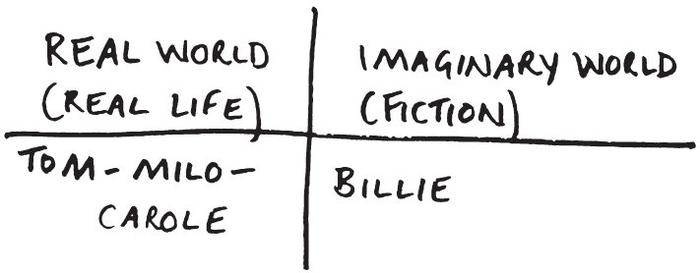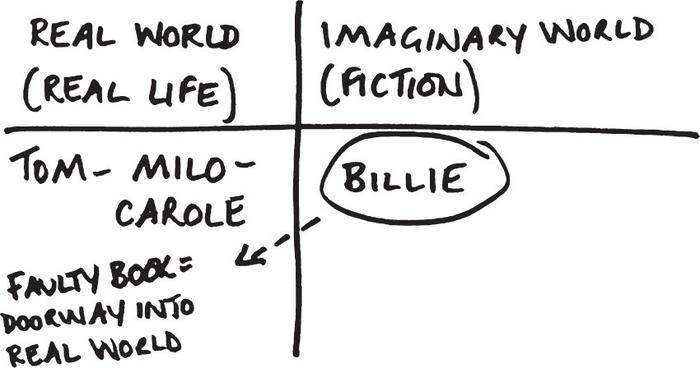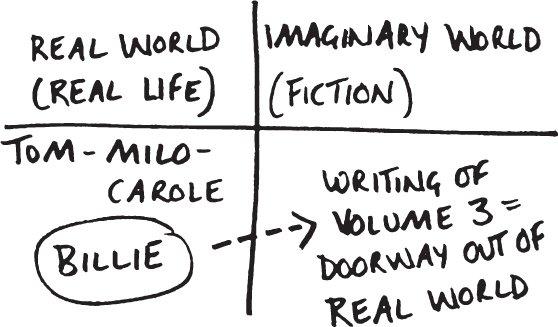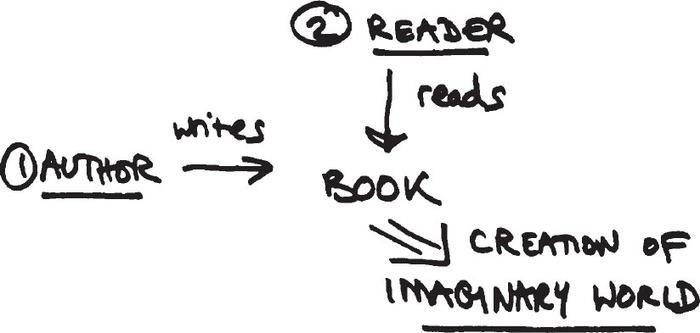The Girl on Paper (19 page)
Authors: Guillaume Musso

Billie was still asleep. Milo had gone to tell Carole what was going on. We had agreed to meet again in two hours at the hotel library to do some research and settle on a plan of action. Walking through the lobby, I came across Aurore checking out.
Her hair was artfully messy, with the obligatory celeb sunglasses. Her outfit was a lesson in boho retro chic:
mini-dress
, biker jacket, high-heeled ankle boots and a vintage travel bag. Most women would have had trouble carrying off the look, but on her it was faultless.
‘You’re leaving?’
‘I’ve got a concert in Tokyo tomorrow night.’
‘At Kioi Hall?’ I asked, surprising even myself at remembering the name of the place she had played when I accompanied her on her tour of Japan.
Her face lit up. ‘Do you remember that old Plymouth Fury you hired? We had such a hard time finding the concert hall I only got there three minutes before the recital was due to start. I was totally out of breath by the time I ran onstage!’
‘Even so, you played really well.’
‘And then after the concert we drove for hours to go see the Hells of Beppu, those incredible hot springs!’
Talking about that night made us both nostalgic. Yes, we’d had moments of happiness together, when we had truly felt carefree – and they weren’t so long ago.
Aurore broke the silence, charming, but a little embarrassed, to apologise for the way Rafael Barros had behaved. She had tried to call me that night to check I was OK, but I wasn’t in my room. While a bellboy took care of her bags, I briefly explained what had happened to Billie. She listened intently. I knew that her mother had died at the age of thirty-nine from breast cancer that had been discovered too late. This sudden loss had turned her into a bit of a hypochondriac, or at least very mindful of her health and that of her loved ones.
‘That sounds very serious. You should take her to see a specialist right away. I can recommend someone if you like.’
‘Who?’
‘Professor Jean-Baptiste Clouseau. He’s the best there is, like a French version of Dr House. He’s the top cardiologist in Paris and spends most of his time putting the finishing touches to a completely man-made heart. But he’ll fit you in if you tell him I sent you.’
‘Old flame of yours, is he?’
She rolled her eyes.
‘He’s a great lover… of music. He often comes to my concerts when I play in Paris. And, if you meet him, you’ll see he’s no Hugh Laurie to look at. But the man’s a genius.’
While she was talking, she had turned on her BlackBerry and was looking for the doctor’s number in her phone book.
‘I’ll send you his details,’ she said, getting into her car.
The car door was closed for her and I watched the sedan drive off toward the massive gate at the entrance to the complex. But after about fifty yards the taxi came to a stop in
the middle of the road and Aurore came running toward me to snatch a kiss from my lips. Before she left again, she took her MP3 player out of her pocket, put the headphones in my ears and left it with me.
I had the taste of her tongue on my lips and my head was filled with the music and lyrics she had lined up for me: my favourite Elvis number, which I’d shared with her back when we loved each other enough to play each other songs.
Maybe I didn’t treat you
Quite as good as I should have
Maybe I didn’t love you
Quite as often as I could have
…
You were always on my mind
You were always on my mind
The reader may be considered the main character in a novel, on a par with the author, since without him, nothing can happen
Elsa Triolet
How could a hotel have such a magnificent library?
Clearly it wasn’t only the clinic that had benefited from the rich sheikh’s generosity. The most striking thing about the place was its old-fashioned rarefied feel. You’d have thought you were in the reading room of a prestigious university. Thousands of beautifully bound tomes filled shelves held up by Corinthian columns. The atmosphere was hushed and intimate, the heavy carved doors, marble busts and antique panelling taking you back several centuries. The only concessions to the modern age were the latest computers built into burr walnut cases.
I would have loved to work somewhere like this when I was young. There was no study at home. If I couldn’t go to Tereza’s apartment, I would shut myself in the bathroom to do my homework, with a board on my lap for a desk and earplugs to block out the neighbours’ shouting.
Even the librarian, with her little round glasses, mohair jumper and tartan skirt, seemed to have been teleported in
from another universe. When I handed her the list of books I wanted to look at, she confessed I was her first reader of the day.
‘Most hotel guests would rather hit the beach than sit down to a bit of Hegel.’
I smiled as she handed me a pile of books, along with a mug of spiced Mexican hot chocolate.
I took them over to a seat beside a Coronelli celestial globe next to one of the large windows, so that I could read in natural light. I got straight to work.
*
The atmosphere was conducive to study. The only thing to disturb the silence was the rustling of pages being turned and the soft sound of my pen gliding over a piece of paper. Several reference books I had dissected in my student days lay open on the table in front of me, including
What is Literature?
by Jean-Paul Sartre, Umberto Eco’s
Lector in fabula
and Voltaire’s
Dictionnaire philosophique
. In the space of two hours, I had written ten pages of notes. I was in my element, surrounded by books, in a world of quiet reflection. I felt like an English teacher again.
‘Whoa, it’s like we’re college boys!’ Milo exclaimed, barging into the august room.
He plonked his bag down on one of the Charleston armchairs and leaned over my shoulder.
‘So, have you found anything?’
‘I may have a plan of attack, but I’ll need your help.’
‘Sure I’ll help.’
‘OK, we need to split up,’ I said, putting the lid back on my pen. ‘You go back to Los Angeles and try to track down that last faulty copy. I know it’s mission impossible, but if that
book’s destroyed there’s no question: Billie’s going to die.’
‘And how about you?’
‘I’m going to take Billie to Paris to see the doctor Aurore recommended. Hopefully we can at least slow the illness down. But most of all…’
I gathered up my notes so I could explain myself as clearly as possible.
‘Most of all?’
‘It’s vital that I write the third volume of the trilogy, to send Billie back to the imaginary world.’
Milo frowned.
‘I don’t exactly see how writing a book is going to literally send her back to her world.’
I picked up my notebook and, in the style of Dr Philipson, tried to bring together the key points I had arrived at.
‘So, the real world’s where you, Carole and I live. It’s where we go about our real lives, surrounded by our fellow humans.’
‘OK, I’m with you so far.’
‘Then on the other side there’s the imaginary world, the realm of fiction and dreams. It’s a world that reflects the subjectivity of every reader. And it’s here that Billie was developing,’ I explained, making a few notes to illustrate my points as I went along.

‘Go on,’ urged Milo.
‘As you said yourself, Billie was able to cross the line between the two worlds because of a production error: the
faulty printing of 100,000 copies of my book. That’s what you call the “doorway in”.’

‘OK,’ he nodded.
‘And now we wind up with Billie fading away in an environment that’s foreign to her.’
‘And the only way to save her is if we find the faulty book to stop her dying in real life—’
‘And send her back to the fictional world by writing the third volume of the book. That’s her “doorway out” of the real world.’

Milo was following my diagram with interest, but I could tell something was bugging him.
‘You still don’t get how writing the third volume’s going to let her leave, do you?’
‘Not exactly.’
‘OK. You’ll see. So, who would you say creates this imaginary world?’
‘You! I mean, the writer.’
‘Right, but not only the writer. I only do half the work.’
‘So who does the other half?’
‘The reader.’
He stared at me blankly, looking even more confused than before.
‘Look what Voltaire wrote in 1764,’ I said, showing him my notes.
He leaned over and read aloud, ‘“The most useful books are those of which readers themselves compose half.”’
I got up and confidently set out my argument.
‘What’s a book at its most basic? It’s just letters laid out in a certain order on sheets of paper. Writing a story isn’t enough to bring it to life. I’ve several early drafts of manuscripts in drawers, that have never been published, but they’re like dead stories to me because no one else has ever set eyes on them. A book only comes to life when it’s read. It’s the reader who pieces together the images that create the imaginary world in which the characters develop.’
Our conversation was interrupted by the underworked librarian coming to offer Milo a mug of spiced hot chocolate. He took a sip before pointing out, ‘Every time one of your books goes into stores and becomes a living thing, you tell me it doesn’t really belong to you any more.’
‘That’s exactly it! It belongs to the reader. The reader picks up where I left off, making the characters his own and letting them come to life in his head. Sometimes he’ll even put his own spin on certain passages and give them a meaning I hadn’t envisaged. But that’s all part of the game!’
Milo was listening intently while scrawling on my notepad.

As far as I was concerned, this theory was watertight. I had always felt that a book only truly existed through its relationship with the reader. Ever since I first began to read, I had always tried to immerse myself as deeply as possible in the imaginary world of my favourite books. I’d try to guess what was going to happen, thinking of hundreds of possible outcomes, always trying to keep one step ahead of the author and even carrying on the story of the characters in my head, long after closing the book. The reader’s imagination took the text way beyond the words printed on the page and allowed the story to fully exist.
‘OK, so if I’ve got this right, you’re saying the writer and the reader work together to create the imaginary world?’
‘It’s not me who said it, Milo. It’s Umberto Eco! It’s Sartre!’ I replied, holding out a book open at the page where I had underlined the sentence: ‘Reading is a pact of generosity between author and reader; each puts his trust in the other, each counts on the other.’
‘But what does all this mean, practically speaking?’
‘It means I’m going to start writing my new novel, but it’ll only be once the first readers get hold of it that the imaginary world will take shape and Billie will leave the real world to go back to her fictional life.’
‘In that case, I’d better get moving,’ Milo said, sitting himself down in front of a computer screen. ‘I have to track down that faulty book, whatever it takes. It’s the only way we’ll keep Billie alive long enough for you to write your new book.’
He logged on to the Mexicana Airlines website.
‘There’s a flight to Los Angeles in two hours. If I leave now, I can be in MacArthur Park this evening.’
‘What’ll you do when you get there?’
‘If you’re planning on taking Billie to Paris, she’ll need a fake passport pretty damn quick. I still know a few people who could help us out.’
‘What about your car?’
He opened his shoulder bag and took out several wads of banknotes, which he split in two.
‘One of Yochida Mitsuko’s guys came for it this morning. This is all I could get for it, but it’ll help us get by for a few weeks at least.’
‘And then we really will be broke.’
‘No denying it. Plus if you add what we owe to the IRS, we’re looking at twenty years in the red.’
‘Forgot to tell me that part, huh?’
‘I thought you’d have realised.’
I tried to take the heat out of the situation.
‘We’re trying to save a life. There’s no nobler cause, is there?’
‘That’s for sure,’ he replied. ‘But is this Billie girl really worth the hassle?’
‘I think she’s one of us,’ I said, struggling to find the right words. ‘I think she could be part of our “family”, the family you, me and Carole made for ourselves. Because, deep down, I know she’s not so different from us. Underneath that hard shell, there’s a sweet, generous person inside. Behind that big mouth there’s a pure heart, and life hasn’t been easy on her so far.’
We hugged, and he was heading out the door when he turned back to face me.
‘Are you sure you’ll be able to write this new book? I thought you couldn’t string two words together any more.’
I looked out the window at the sky. Thick, grey clouds clogged the horizon, like an English landscape.
‘Do I really have a choice?’ I asked, closing my notebook.
